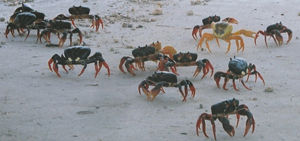
Your complimentary articles
You’ve read one of your four complimentary articles for this month.
You can read four articles free per month. To have complete access to the thousands of philosophy articles on this site, please
Editorial
Existing in the World
by Rick Lewis
When most of us think of existentialism, we imagine a bunch of broody French intellectuals in rollneck sweaters, sitting around a table in a café on Paris’s Left Bank, smoking Gauloises and drinking endless coffees as they stare into the abyss within the human soul. And this is broadly accurate, but there is more to it than that. Existentialism continues to be the most popular and best recognized school of philosophy, and we get complaints if we don’t publish an issue about it at least once every couple of years. You are holding that issue.
Existentialism started not in France but in the previous century in Denmark, with the highly unorthodox Christian thinker Søren Kierkegaard. He introduced the idea that in our journey through life we have the opportunity to make a ‘leap of faith’, to commit to a belief even though the evidence isn’t there. Most later existentialists were not religious, but the hero making a commitment, or sometimes making a disastrous mistake, is a recurrent theme of existentialist novels and plays. Existentialism, in contrast to much preceding philosophy, insists that existence precedes essence. In other words, there is no such thing as an immutable essence of a human being. Instead, first of all we exist. At birth we are thrown into a universe that doesn’t much care about us, and we have to make the best of ourselves – individually and in relation to one another – as we go along. We define ourselves by our choices and we have to make those choices without complete information. Our unlimited freedom is actually a burden, for there is no avoiding choices – even doing nothing is a choice – and no escaping moral responsibility for what we do. The awareness of this causes a state of angst or anxiety. The temptation to deny our own freedom, to pretend that we are mere cogs in a machine, mere products of our environment or mere puppets of determinism, is therefore strong and widespread. Sartre condemns this, calling it ‘bad faith’. He, and other existentialists, call on us to live lives which are authentic – meaning that we see our human predicament with clear eyes and do not shirk the burden of our freedom. Yet looming over this is an awareness that while our projects and values and commitments matter to us, they do not matter to the universe. Our lives are brief and our carefully-laid plans liable to be upended in an instant by casual chance. Albert Camus called this the ‘absurd’.
It might be useful to divide existentialism into a descriptive part – understanding ourselves and our absurd pretensions and unbearable, unshirkable freedom in a cold uncaring universe – and a prescriptive part – a guide to how we should live. To the descriptive part people tend to nod along and say “Yeah, I know what you mean, life is a bit like that isn’t it? Especially on Mondays.” By contrast, people tend to be less convinced by the prescriptive part. If pressed, they might agree that people should live authentic lives, but they might do so with their fingers crossed behind their backs. Isn’t there much more to living well? Here it gets fuzzy. Despite the best efforts of, for instance, Simone de Beauvoir (see her Ethics of Ambiguity) it is probably fair to say that there is no widely-accepted existentialist system of ethics. Sartre made clear his belief that philosophy cannot in the end tell you what to do. Wanting it to do so is another example of denying your own freedom.

Sartre had a morbid fear of seafood
© Sudzie 2005 CC Licence 4.0
Maybe we can gain some clues about existentialism’s implications by considering how its proponents have lived and loved? Sartre may not be the most shining exemplar in this regard; Sam Kelly’s article exposes his drug-induced hallucinations and morbid fear of seafood. Life it is, pretty it ain’t. Annabel Abbs explores Simone de Beavoir’s love of hiking, which was altogether more wholesome and took her and her ideas out into the fresh air. This issue will also introduce you to some less well-known existentialist thinkers. One of them is the African-American writer Richard Wright, who escaped from his own hard life for a while to hang out with Sartre, de Beauvoir, Camus and their friends in 1950s Paris. He wrote a novel called The Outsider, and brilliantly portrayed the alienation he knew so well. The Norwegian mountaineer and existentialist Peter Zapffe was by all accounts quite a cheerful person, but his prognostications outdid even those of Sartre for sheer gloominess, as you can read here for yourself. Greg Artus considers the Look of the Other, which is bound to be important for a sociable species like humans. Afik Rashid writes amiably on another key concept – the splintering of personal and social identity.
The high noon of existentialist thought may have ended, but many people continue to find that existentialism resonates with literature and movies of all kinds, and sometimes with real life too. In particular, the idea that meaning and values are not sewn into the fabric of the universe but that we must invent them for ourselves has become ever more widely held. So, how appropriate that this issue also contains readers’ answers to our last Question of the Month competition, which asked: “What is the most fundamental value?” What would your answer have been?









